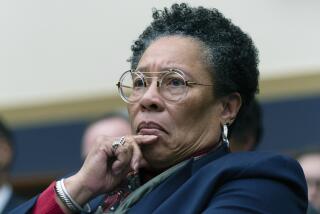Hamilton Says He’ll Quit, Denies Official Pressure
Los Angeles City Planning Director Calvin Hamilton on Monday confirmed that he will retire next April or May and said “pressure” created by recent articles in The Times led to his decision.
Hamilton, a colorful and controversial administrator who has overseen city planning and development for 20 years, denied that top city officials pressured him to step down.
“I felt absolutely none (from them)” he said in an interview. “No one had spoken to me at all until (The Times) had written that article and started to stir things up.”
He was referring to a July 15 article that reported a movement to replace Hamilton by top city officials, who said they were concerned that he was not up to the demands of a new, increasingly political era of urban development.
While describing Hamilton as a “visionary,” the July 15 story said, some officials expressed fear that he might not have the administrative skills necessary to guide the planning department through a massive court-ordered rezoning program intended to bring hundreds of thousands of parcels into conformance with the city General Plan.
Credibility Question
The story also noted that Hamilton’s credibility suffered last year when it was learned that he had used city staff members to help promote a private trade and tourism organization he had set up.
Hamilton was quoted in the story as saying that he was aware of growing discontent with his performance, and might resign, although not immediately.
William McCarley, chief legislative analyst for the City Council, said in an interview that he had met with Hamilton in the week before the story appeared. McCarley said he told Hamilton that Council President Pat Russell and other city officials felt that the Planning Department needed new leadership.
On the day the article appeared, Mayor Tom Bradley told a local radio station that “we need to look for a change and a new style . . . the need now is for someone with a more down-to-earth practical style.”
Meeting With Mayor
The mayor met with Hamilton the next day. The day after that, the mayor announced that the planning director would step down next spring. Hamilton declined to comment on the announcement at the time.
Hamilton said Monday that Times coverage of him, including an editorial last week that called on the mayor to urge him to step aside, had made him a “political embarrassment” and “created an environment that made it extremely difficult for the mayor and council.”
In his meeting with the mayor, Hamilton said the timing of his retirement was discussed but no mention was made of the need for a “new style.” “When I talked to (the mayor) he was very supportive,” he said.
He insisted that one of the major criticisms of him--that he contributed to the city’s failure to rezone property to bring it into conformance with the General Plan--was “just plain not true.”
Hamilton is best known for his work on the plan, a guide for future development that divides the city into commercial and residential spheres and runs counter to the city’s older zoning code, which permitted considerable commercial development in many residential areas.
Objective of Plan
The purpose of the plan, which envisions about 20 commercial clusters surrounded by residential neighborhoods, is to make it easy for people to live near where they work, but in neighborhoods free of commercial development.
The city’s inability to convert the plan into action led to a lawsuit by a federation of homeowners’ groups that resulted in a court order to rezone about one-quarter of the land in the city over the next three years.
Some homeowner groups were unhappy with Hamilton for not moving faster on rezoning and developers faulted him for not heading off the lawsuit, which they fear may now lead to more restrictive zoning.
Hamilton said that he has advocated rolling back zoning to conform with the plan for many years. The rollback did not occur because he did not have a large enough staff to do the work and because the mayor and the City Council placed higher priority on other projects, he said. “It’s a difficult job and there are some council members who really didn’t want to tackle it,” Hamilton said of the rezoning.
After he retires, Hamilton said, he plans to become a “futures consultant,” offering corporations, cities and foreign countries advice on how to plan.
More to Read
Sign up for Essential California
The most important California stories and recommendations in your inbox every morning.
You may occasionally receive promotional content from the Los Angeles Times.










